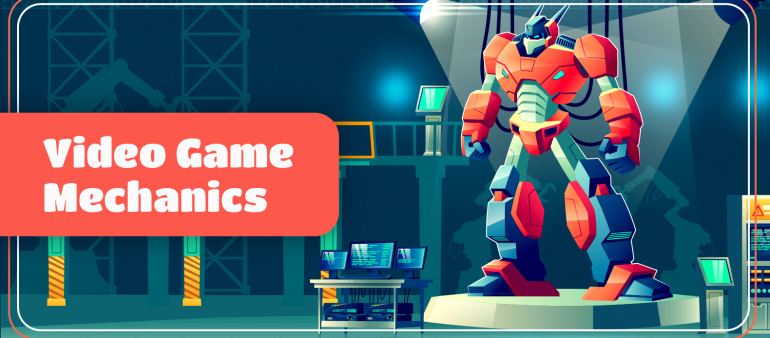There is one area every game designer must focus on to ensure that their games are captivating enough to entertain and provide an impactful experience to the user: game mechanics. When creating a new game, video game mechanics are often considered the most important factor.
In this blog, we will explain game mechanics, their benefits, and the crucial role of a game designer in utilizing these mechanics to craft captivating games. So let’s get started.
What are game mechanics?
Game mechanics refer to the rules, interactions, and systems that guide the player's actions. In simple terms, they define how the game functions and what determines its success or failure in the game. Game mechanics include everything from character movement and battle mechanics to puzzle-solving and resource management. Successful video game mechanics give players a sense of challenge, progression and reward, keeping them engaged for hours. They serve as the backbone of every engaging game, developing unique and innovative mechanics that differentiate the game from others.
Game Designers' role in video game mechanics
1. Our game design team conceptualizes, implements, and manages gameplay systems that produce addictive game loops, an enjoyable flow state and a risk/reward balance. If you are in need of expert game designers for hire, we have a skilled team ready to craft captivating games for your project.
2. Create and maintain detailed documentation (like design sketches, visual mock-ups and diagrams) that describes the triggers, interactions and subsequent events of certain gameplay elements or components.
3. Work closely with User Experience (UX) and User Interface (UI) designers to improve the player interface.
4. Create various levels and environments within the game. They design the layouts, obstacles, and puzzles to create a smooth player experience.
Benefits of game mechanics in engaging gameplay
Progression system
The progression system is an essential aspect of game mechanic design. By using strategic rewards, like leveling systems, unlockable achievements, and character progression, players can feel a sense of success and advance within the game. A well-designed player progression system may significantly improve gameplay by providing something to aim for and look forward to while engaging with your product.
Flow
Game mechanics are designed to give players a sense of flow and engagement. They are designed so that users feel compelled to proceed from one challenge to the next in order to progress through the game. This keeps players immersed in the experience for longer, enhancing user engagement and retention.
Rewards and incentives
Rewards and incentives are essential to keep players interested in the game. By incorporating rewards into your game, like virtual items, in-game currency or access to premium content, you can encourage players to complete the given tasks, thus increasing their motivation.
Balance and challenge
A balanced game provides suitable challenges to gamers while ensuring they remain achievable. So, you must gradually raise the complexity or introduce new mechanics to keep players intrigued and prevent them from getting bored or frustrated.
Interactive gameplay
Integrating interactive elements that respond to the action of the player improves immersion. Responsive controls, dynamic settings and realistic physics give players a sense of power and make the game more interesting.
Open-ended exploration
Video game mechanics design is the process of developing and creating mechanics that regulate the operation of a game. It involves objectives, rules, obstacles and other elements that determine what the player can do within the game and how they interact with it. By employing open-ended exploration through game mechanic design, you can develop games that allow players to freely explore their world without being confined by pre-determined goals or outcomes.
Social features
Multiplayer and social aspects enable gamers to interact and compete with one another. Whether it is intense multiplayer battles or cooperative games, social interaction improves the entire gameplay by generating a feeling of competition and community.
Emergent gameplay
The significant benefit of video game mechanics design is that it allows you to create emergent gameplay - that is, situations where players can make choices and take actions that lead to unexpected results. This provides a more dynamic gameplay experience. With emergent gameplay, you can provide your players with the ability to shape their own narratives depending on the decisions they make while playing.
Now that you have acquired the fundamentals of video game mechanics, it is time to unleash your creativity and explore how to incorporate them into your game. Many game development companies offer game development services. Logic Simplified is a top game development company that provides a wide range of services for 2D and 3D game projects. We use various tools to create everything from board games to casual, puzzle, educational, strategy and other game genres - ensuring that whatever game our client requires is delivered. To know more about us, contact us or drop us an email at enquiry@logicsimplified.com.
 Get a Quote
Get a Quote













